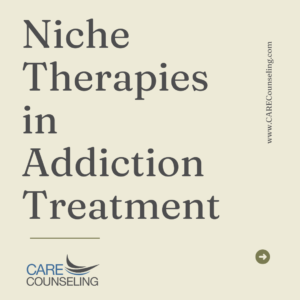Exploring Niche Therapies in Addiction Treatment
 Addiction is a complex condition that affects millions of lives worldwide. While traditional therapies and interventions have proven effective, emerging niche therapies are gaining recognition for their unique and valuable contributions to addiction treatment. In this blog post, we’ll explore some of these less commonly known approaches, including equine therapy, adventure therapy, and biofeedback, and delve into their effectiveness in helping individuals on the path to recovery.
Addiction is a complex condition that affects millions of lives worldwide. While traditional therapies and interventions have proven effective, emerging niche therapies are gaining recognition for their unique and valuable contributions to addiction treatment. In this blog post, we’ll explore some of these less commonly known approaches, including equine therapy, adventure therapy, and biofeedback, and delve into their effectiveness in helping individuals on the path to recovery.
Equine Therapy: Healing Through Horses
Equine therapy, also known as equine-assisted therapy or horse therapy, is a holistic approach to addiction treatment that involves interacting with horses under the guidance of a trained therapist or counselor. The presence of horses creates a unique and powerful environment for healing, offering several benefits:
- Emotional Regulation: Horses are highly sensitive animals that respond to human emotions. Interacting with them can help individuals struggling with addiction learn to regulate their emotions and develop self-awareness.
- Non-Judgmental Relationships: Horses provide unconditional acceptance and do not judge. This can be particularly meaningful for individuals who have experienced stigma or rejection due to their addiction.
- Trust-Building: Building trust is a fundamental aspect of equine therapy. Learning to establish trust with a horse can translate into improved relationships with humans.
- Communication Skills: Horses communicate through nonverbal cues, which can help individuals improve their communication skills, both in therapy and in their daily lives.
Adventure Therapy: Nature as a Catalyst for Change
Adventure therapy is an innovative approach that takes therapy sessions outdoors, often involving activities such as hiking, rock climbing, and wilderness exploration. This therapy emphasizes personal growth, self-discovery, and overcoming challenges, making it an effective tool in addiction treatment for several reasons:
- Empowerment: Adventure therapy encourages individuals to step out of their comfort zones, fostering a sense of empowerment and self-confidence that can be instrumental in recovery.
- Stress Reduction: Being in nature has been shown to reduce stress and anxiety. For individuals in addiction recovery, this can be a vital component of healing.
- Team Building: Group activities in adventure therapy promote teamwork, cooperation, and communication skills, all of which are essential for maintaining sobriety and building a support network.
- Experiential Learning: Through experiential learning, individuals can gain insights into their behavior, patterns, and triggers, which can lead to more effective coping strategies.
Biofeedback: Harnessing the Mind-Body Connection
Biofeedback is a therapeutic technique that teaches individuals to control physiological functions like heart rate, muscle tension, and skin temperature. It offers real-time information about the body’s responses and has been applied effectively in addiction treatment:
- Stress Reduction: Biofeedback helps individuals recognize their body’s stress responses and teaches them relaxation techniques to manage stress without turning to substances.
- Self-Regulation: Learning to control physiological functions empowers individuals to take control of their physical and emotional well-being, reducing the likelihood of relapse.
- Increased Mindfulness: Biofeedback promotes mindfulness by encouraging individuals to pay close attention to their bodily sensations and responses, a skill that can help prevent impulsive behaviors associated with addiction.
- Customized Treatment: Biofeedback can be customized to address specific issues related to addiction, such as anxiety, depression, or insomnia.
Effectiveness of Niche Therapies
While emerging niche therapies like equine therapy, adventure therapy, and biofeedback may not be suitable for every individual or every stage of addiction recovery, they have shown promise in helping individuals overcome addiction, improve their mental health, and enhance their overall well-being. The effectiveness of these therapies lies in their ability to provide unique, holistic approaches to healing.
- Improved Emotional Well-Being: Equine therapy fosters emotional regulation and self-awareness, while adventure therapy empowers individuals to overcome challenges and build self-confidence.
- Stress Reduction: Both adventure therapy and biofeedback have been proven to reduce stress levels, a crucial factor in addiction recovery.
- Enhanced Coping Skills: Adventure therapy encourages experiential learning and problem-solving, equipping individuals with valuable coping skills for life’s challenges.
- Customization: The flexibility of niche therapies allows treatment plans to be customized to meet everyone’s unique needs and preferences.
- Holistic Healing: Niche therapies acknowledge the interconnectedness of the mind and body, promoting holistic healing that addresses all aspects of an individual’s well-being.
Equine therapy, adventure therapy, and biofeedback provide unique opportunities for individuals in recovery to develop essential life skills, gain self-confidence, and achieve emotional and physiological balance.
While traditional therapies remain crucial in addiction treatment, integrating niche therapies into comprehensive treatment plans can enhance the recovery process and increase the chances of long-term success. These therapies are a testament to the boundless creativity and dedication of professionals working to improve the lives of those affected by addiction.



























